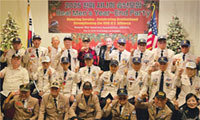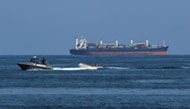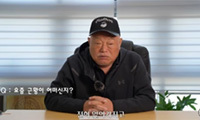BAQUBA, Iraq - The Diyala State Company for Electrical Industries here staggers along, making transformers, spark plugs, ceiling fans and steam irons that few want or can afford anymore.
Its labor force has tripled in size, even as production has slumped. A deal to lure $60 million in foreign capital - one of only a handful of foreign investments in Iraq’s state-owned industries - collapsed. The American government recently gave the company $2.5 million to keep its main production line operating and its workers out of penury and, perhaps, insurgency.
The United States and Iraq will gather officials and company executives for a conference on October 20-21 in Washington intended to send a message that after six years of war, Iraq is open for business, and not just in oil. Now more than ever before, Iraqi officials boast that a trickle of foreign investment - including the first new hotel in Baghdad since Saddam Hussein’s government fell - is at last poised to be a flood.
The experience of the company here, though, shows that economic development and foreign investment face more obstacles than security alone.
The state-owned industries that dominate the country’s economy - from oil fields to dairies to textile factories - are as bloated and inefficient as they were under Saddam, arguably more so. They are hobbled by corruption, still sporadic electricity and poor roads and bound by bureaucracy and central planning that leave them unable to compete with a flood of cheap imports from Iran, Turkey and beyond.
New legislation intended to regulate investments, land rights, taxes, financial services and consumer protections remains stalled in Parliament. The mere mention of the sort of privatization that swept Eastern Europe and the former Soviet Union after the collapse of Communism is anathema to officials here.
“We are not after shock therapy,” Sami al-Araji, the chairman of Iraq’s national investment commission, said in an interview. “We are after a gradual change from a centrally controlled economy to an open one.”
Prime Minister Nuri Kamal al-Maliki publicly pressed Vice President Joseph R. Biden Jr. last month about “the need for this conference to be a success.”
Privately, though, American officials express concern that it will be little more than a political exercise before Mr. Maliki’s re-election campaign unless the Iraqis do more to create a solid foundation for foreign investors willing to take a risk on the country’s prospects.
Mr. Biden, in his meetings with Mr. Maliki and other senior leaders, stressed the need for better regulatory and financial systems, according to a senior official traveling with him.
Few, though, expect the investment legislation to proceed before next year’s parliamentary elections, putting off significant reforms, and thus investment, for at least a year. “Capital is cowardly,” said Mejul Mahdi Ali, the president of Diyala’s newly created investment commission. “It is always looking for a safe place.”
As he spoke, an explosion reverberated through Baquba; a roadside bomb killed three police officers.
Mr. Ali complained that many government ministers had showed little interest in foreign or private investment, or even actively opposed it. The provincial government’s idea of economic development, he said, is a plan to buy 10,000 taxis and lease them to drivers, against his advice. Baquba might soon be the easiest place in the world to catch a cab, but he said, “That’s not investment.”
스마터리빙
more [ 건강]
[ 건강]이제 혈관 건강도 챙기자!
[현대해운]우리 눈에 보이지 않기 때문에 혈관 건강을 챙기는 것은 결코 쉽지 않은데요. 여러분은 혈관 건강을 유지하기 위해 어떤 노력을 하시나요?
 [ 건강]
[ 건강]내 몸이 건강해지는 과일궁합
 [ 라이프]
[ 라이프]벌레야 물럿거라! 천연 해충제 만들기
 [ 건강]
[ 건강]혈압 낮추는데 좋은 식품
[현대해운]혈관 건강은 주로 노화가 진행되면서 지켜야 할 문제라고 인식되어 왔습니다. 최근 생활 패턴과 식생활의 변화로 혈관의 노화 진행이 빨라지고
사람·사람들
more
‘러브인뮤직’ 2025 성탄 음악회 성료
러브인뮤직은 지난 20일 LA 동양선교교회(담임 김지훈 목사)에서 가진 2025 성탄 작은 음악회를 끝으로 각 지역 봉사처별 올해 활동을 마무…

한인 향군 단체들 ‘진짜사나이’ 송년 행사
6·25 참전유공자회(회장 이재학)와 육군협회(회장 최만규)가 공동 주최한 2025 ‘진짜사나이’ 송년모임이 지난 19일 LA 용궁식당에서 한…
“취미생활로 다진 친목… 선후배들과 만든 모교사랑…
사진러브한인 사진 동호회 사진러브(회장 크리스 고)는 13일 용수산에서 송년모임을 갖고 한 해를 마무리하는 뜻깊은 시간을 가졌다. 이날 모임에…
[홀인원] 이상원 박사
일반외과 전문의 이상원(왼쪽) 박사가 지난 9일 뉴포트비치 소재 골프장 9번 홀(152야드)에서 레스큐 클럽으로 친 샷이 그대로 홀에 빨려 들…
[송년행사 게시판] 재미시인협회
재미시인협회(회장 지성심)는 오는 20일 오후 4시 가든스윗호텔에서 한 해를 마무리하며 동인지 ‘외지’ 제35집 출판 기념회와 ‘제23회 재미…
많이 본 기사
- 연말 ‘로드레이지’ 비극… 한인 총격 피살
- 밴스에 줄선 찰리 커크의 ‘마가 제국’…차기 대선후보 띄우기
- ICE 홈디포 급습단속에 한인 체포 1
- “올해 미국서 AI 사유로 일자리 5… 1
- 특검, ‘김건희 집사’ 김예성에 징역 8년 구형… “죄질 불량”
- ‘통일교 특검’ 출범 초읽기…與, 지지층 여론·野 압박에 수용
- ‘거액 탈세·통관 사기’ 한인 통관브로커 중형
- 한국계 NASA 우주비행사 조니 김 … 1
- 성탄 연휴 폭우 ‘비상’ 주중 최대 6인치 온다
- ‘SNS 검증’에 비자심사 적체… “최대 12개월 지연”
- 2026년을 기다리며… 타임스퀘어 벌써 새해맞이 분위기
- 내란전담재판부법 국회 본회의 상정…여야 필버 거쳐 내일 표결
- ‘정치 손절’ 김흥국 “내년 선거 때 연락하지마..아들·딸 보기 부끄러워”
- 트럼프, 건강보험사들에 “보험료 내려라”압박
- 오늘 동지… 한인타운서 동지팥죽 함께 나누기 행사
- “재외선거 우편투표 본격 추진”
- 냉장고 문짝 1초 만에 조립… ‘다크 팩토리’ 성큼
- 고등학교 성적 인플레… SAT 점수 중요성 다시 부각
- 송성문, MLB 샌디에고행… 이정후·김혜성과 ‘히어로즈 더비’
- 미 자동차 업계… 전기차 접고 내연차로 회귀
- 에어프레미아 9호기 도입 중·장거리 노선에 투입
- 중국 틱톡, 미 합작사 설립 합의
- 수주 물량 최소 750억달러… 미국 원전 특수 열린다
- ‘탄소배출권 수익’으로 서민주택 대거 공급
- ‘최강’ 안세영, 왕중왕전서 시즌 11승… 최다승 타이로 피날레
- 이정후, MLB닷컴 선정 ‘2025 세계 올스타’
- 여름 방학 계획 미리 살펴보기
- 한국 이어 미국 주주들로 ‘쿠팡’ 집단소송
- 이미지 도구 업데이트 오픈AI, 새 버전 출시
- “금리 인하 여지 충분” 백악관, ‘빅컷’ 재강조
- 관세로 준다던 미군 보너스 알고보니 ‘주택보조금’ 예산
- 조기전형 결과가 인생 결정하지 않는다
- “아동용 스마트 장난감, 보안 취약”
- WINTER HOLIDAYS, 2025
- 명품 재정보조를 위한 사전설계의 역설계
- 트럼프, 글로벌 제약사 약값 인하 발표
- 연준, 올해 세 번째 금리 인하… 내 지갑엔 어떤 변화?
- 미국인 5명중 1명만 “트럼프 덕에 살림살이 나아졌다”
- 말살되고 있는 유럽의 성탄절 전통, 그 원인은…
- 머스크 재산 7,490억달러 사상 첫 7천억달러 돌파
- 미국인 절반, 연말 선물구매 ‘부담’
- 고물가에 연말 샤핑 ‘실속형’… 양말·커피·기저귀 선물
- 휴 스턴, 덴버 7연승 저지 ‘신인’셰퍼드 28점 활약
- ‘재미 이산가족 상봉 지원법’ 트럼프 서명
- 파워볼 로토 열풍 지속 오늘 잭팟 16억 달러로
- 뉴욕연은총재, ‘소비자물가’ 왜곡 가능성
- 외로운 이웃들
- ‘1세대 연극 스타’ 윤석화 뇌종양 투병 69세로 별세
- ‘러브인뮤직’ 2025 성탄 음악회 성료
- 한인 향군 단체들 ‘진짜사나이’ 송년 행사
1/5지식톡

-
 ☝️해외에서도 가능한 한국어 선생님…
0
☝️해외에서도 가능한 한국어 선생님…
0이 영상 하나면 충분합니다!♥️상담신청문의♥️☝️ 문의 폭주로 '선착순 상담'만 진행합니다.☎️ : 02-6213-9094✨카카오톡ID : @GOODEDU77 (@골뱅이 꼭 붙여주셔야합니다…
-
 테슬라 자동차 시트커버 장착
0
테슬라 자동차 시트커버 장착
0테슬라 시트커버, 사놓고 아직 못 씌우셨죠?장착이 생각보다 쉽지 않습니다.20년 경력 전문가에게 맡기세요 — 깔끔하고 딱 맞게 장착해드립니다!장착비용:앞좌석: $40뒷좌석: $60앞·뒷좌석 …
-
 식당용 부탄가스
0
식당용 부탄가스
0식당용 부탄가스 홀세일 합니다 로스앤젤레스 다운타운 픽업 가능 안녕 하세요?강아지 & 고양이 모든 애완동물 / 반려동물 식품 & 모든 애완동물/반려동물 관련 제품들 전문적으로 홀세일/취급하는 회사 입니다 100% …
-
 ACSL 국제 컴퓨터 과학 대회, …
0
ACSL 국제 컴퓨터 과학 대회, …
0웹사이트 : www.eduspot.co.kr 카카오톡 상담하기 : https://pf.kakao.com/_BEQWxb블로그 : https://blog.naver.com/eduspotmain안녕하세요, 에듀스팟입니다…
-
 바디프렌드 안마의자 창고 리퍼브 세…
0
바디프렌드 안마의자 창고 리퍼브 세…
0거의 새제품급 리퍼브 안마의자 대방출 한다고 합니다!8월 23일(토)…24일(일) 단 이틀!특가 판매가Famille: $500 ~ $1,000Falcon: $1,500 ~ $2,500픽업 & 배송직접 픽업 가능LA…
케이타운 1번가
오늘의 1면
오피니언
 옥세철 논설위원
옥세철 논설위원말살되고 있는 유럽의 성탄절 전통, 그 원인은…

외로운 이웃들
 조지 F·윌 워싱턴포스트 칼럼니스트
조지 F·윌 워싱턴포스트 칼럼니스트 [조지 F. 윌 칼럼] MIT에 대한 트럼프의 무분별한 공격
 전지은 수필가
전지은 수필가 ‘소명’이라 알아듣고
 최문선 / 한국일보 논설위원
최문선 / 한국일보 논설위원[지평선] 쿠팡의 “한국말 몰라요”

잇단 총격·테러 음모… 한인타운 안전 우려

2025년, 성찰과 감사의 마무리를
 김인자 시인ㆍ수필가
김인자 시인ㆍ수필가 [금요단상] AI와 동거, 그 실체
 한영일 / 서울경제 논설위원
한영일 / 서울경제 논설위원[만화경] 웰다잉 인센티브
1/3지사별 뉴스

퀸즈장로교회 ‘사랑의 바구니’130개 이웃에 전달
퀸즈장로교회가 18일 크리스마스를 앞두고 교인들의 정성과 사랑이 듬뿍 담긴 ‘사랑의 바구니’ 130개를 소방서와 경찰서, 요양원, 선교회, 그…
시민권 박탈 착수⋯매달 200명

“이웃 돌보는 여러분이 동역자”
워싱턴성광교회(담임목사 임용우)는 18일 한인단체와 소방서‧도서관 등에 총 2만9천 달러의 성금을 전달했다. 지난 2011년부터 15년째 지역…
소기업 지원에 1천만 달러 투자

백악관 “인플레, 목표치보다 낮아…금리 더 일찍 내렸어야”
케빈 해싯 백악관 국가경제위원회(NEC) 위원장은 21일 중앙은행인 연방준비제도(Fed·연준)가 “금리를 더 일찍 내렸어야 했다”고 말했다.해…
엡스타인 파일 공개 다음날 트럼프 사진 삭제…야당서 탄핵 경고

오늘 하루 이 창 열지 않음 닫기 



















































.png)


댓글 안에 당신의 성숙함도 담아 주세요.
'오늘의 한마디'는 기사에 대하여 자신의 생각을 말하고 남의 생각을 들으며 서로 다양한 의견을 나누는 공간입니다. 그러나 간혹 불건전한 내용을 올리시는 분들이 계셔서 건전한 인터넷문화 정착을 위해 아래와 같은 운영원칙을 적용합니다.
자체 모니터링을 통해 아래에 해당하는 내용이 포함된 댓글이 발견되면 예고없이 삭제 조치를 하겠습니다.
불건전한 댓글을 올리거나, 이름에 비속어 및 상대방의 불쾌감을 주는 단어를 사용, 유명인 또는 특정 일반인을 사칭하는 경우 이용에 대한 차단 제재를 받을 수 있습니다. 차단될 경우, 일주일간 댓글을 달수 없게 됩니다.
명예훼손, 개인정보 유출, 욕설 등 법률에 위반되는 댓글은 관계 법령에 의거 민형사상 처벌을 받을 수 있으니 이용에 주의를 부탁드립니다.
Close
x